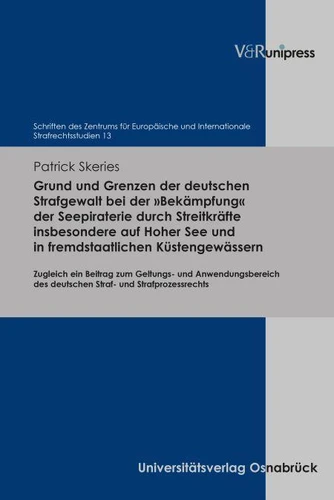Grund und Grenzen der deutschen Strafgewalt bei der »Bekämpfung« der Seepiraterie durch Streitkräfte insbesondere auf Hoher See und in fremdstaatlichen Küstengewässern. Zugleich ein Beitrag zum Geltungs- und Anwendungsbereich des deutschen Straf- und Strafprozessrechts
Par :Formats :
Disponible dans votre compte client Decitre ou Furet du Nord dès validation de votre commande. Le format PDF est :
- Compatible avec une lecture sur My Vivlio (smartphone, tablette, ordinateur)
- Compatible avec une lecture sur liseuses Vivlio
- Pour les liseuses autres que Vivlio, vous devez utiliser le logiciel Adobe Digital Edition. Non compatible avec la lecture sur les liseuses Kindle, Remarkable et Sony
 , qui est-ce ?
, qui est-ce ?Notre partenaire de plateforme de lecture numérique où vous retrouverez l'ensemble de vos ebooks gratuitement
Pour en savoir plus sur nos ebooks, consultez notre aide en ligne ici
- Nombre de pages472
- FormatPDF
- ISBN978-3-8470-1701-1
- EAN9783847017011
- Date de parution11/03/2024
- Protection num.pas de protection
- Taille5 Mo
- Infos supplémentairespdf
- ÉditeurV&R Unipress
Résumé
Bei einem Streitkräfteeinsatz zur Bekämpfung der Seepiraterie hat das Militär den ersten Zugriff auf ein Kriminalitätsphänomen. Ausgehend von den völker- und verfassungsrechtlichen Rahmenbedingungen sowie den straftheoretischen Grundlagen staatlicher Strafgewalt zeigt sich, dass das deutsche Strafrecht das Phänomen Seepiraterie in weitem Umfang erfasst. Die Geltungsreichweite des materiellen Strafrechts bestimmt auch diejenige des Prozessrechts.
Soldaten, die auf Hoher See oder in fremdstaatlichen Küstengewässern zur Bekämpfung der Piraterie eingesetzt sind, dürfen sich daher auf bestimmte strafprozessuale Befugnisnormen berufen, soweit sie bei materiell-funktionaler Betrachtung Strafverfolgung betreiben. The work is based on the question of whether and to what extent the use of armed forces to combat maritime piracy can be presented and justified as an exercise of extraterritorial criminal power.
Based on the international and constitutional legal framework as well as the criminal theory foundations of state penal power, it shows that German criminal law covers the phenomenon of maritime piracy to a large extent. The scope of substantive criminal law also determines that of procedural law. Soldiers who are deployed on the high seas or in foreign coastal waters to combat piracy may therefore rely on certain standards of criminal procedural authority to the extent that they carry out criminal prosecution from a substantive and functional perspective.
Soldaten, die auf Hoher See oder in fremdstaatlichen Küstengewässern zur Bekämpfung der Piraterie eingesetzt sind, dürfen sich daher auf bestimmte strafprozessuale Befugnisnormen berufen, soweit sie bei materiell-funktionaler Betrachtung Strafverfolgung betreiben. The work is based on the question of whether and to what extent the use of armed forces to combat maritime piracy can be presented and justified as an exercise of extraterritorial criminal power.
Based on the international and constitutional legal framework as well as the criminal theory foundations of state penal power, it shows that German criminal law covers the phenomenon of maritime piracy to a large extent. The scope of substantive criminal law also determines that of procedural law. Soldiers who are deployed on the high seas or in foreign coastal waters to combat piracy may therefore rely on certain standards of criminal procedural authority to the extent that they carry out criminal prosecution from a substantive and functional perspective.
Bei einem Streitkräfteeinsatz zur Bekämpfung der Seepiraterie hat das Militär den ersten Zugriff auf ein Kriminalitätsphänomen. Ausgehend von den völker- und verfassungsrechtlichen Rahmenbedingungen sowie den straftheoretischen Grundlagen staatlicher Strafgewalt zeigt sich, dass das deutsche Strafrecht das Phänomen Seepiraterie in weitem Umfang erfasst. Die Geltungsreichweite des materiellen Strafrechts bestimmt auch diejenige des Prozessrechts.
Soldaten, die auf Hoher See oder in fremdstaatlichen Küstengewässern zur Bekämpfung der Piraterie eingesetzt sind, dürfen sich daher auf bestimmte strafprozessuale Befugnisnormen berufen, soweit sie bei materiell-funktionaler Betrachtung Strafverfolgung betreiben. The work is based on the question of whether and to what extent the use of armed forces to combat maritime piracy can be presented and justified as an exercise of extraterritorial criminal power.
Based on the international and constitutional legal framework as well as the criminal theory foundations of state penal power, it shows that German criminal law covers the phenomenon of maritime piracy to a large extent. The scope of substantive criminal law also determines that of procedural law. Soldiers who are deployed on the high seas or in foreign coastal waters to combat piracy may therefore rely on certain standards of criminal procedural authority to the extent that they carry out criminal prosecution from a substantive and functional perspective.
Soldaten, die auf Hoher See oder in fremdstaatlichen Küstengewässern zur Bekämpfung der Piraterie eingesetzt sind, dürfen sich daher auf bestimmte strafprozessuale Befugnisnormen berufen, soweit sie bei materiell-funktionaler Betrachtung Strafverfolgung betreiben. The work is based on the question of whether and to what extent the use of armed forces to combat maritime piracy can be presented and justified as an exercise of extraterritorial criminal power.
Based on the international and constitutional legal framework as well as the criminal theory foundations of state penal power, it shows that German criminal law covers the phenomenon of maritime piracy to a large extent. The scope of substantive criminal law also determines that of procedural law. Soldiers who are deployed on the high seas or in foreign coastal waters to combat piracy may therefore rely on certain standards of criminal procedural authority to the extent that they carry out criminal prosecution from a substantive and functional perspective.



